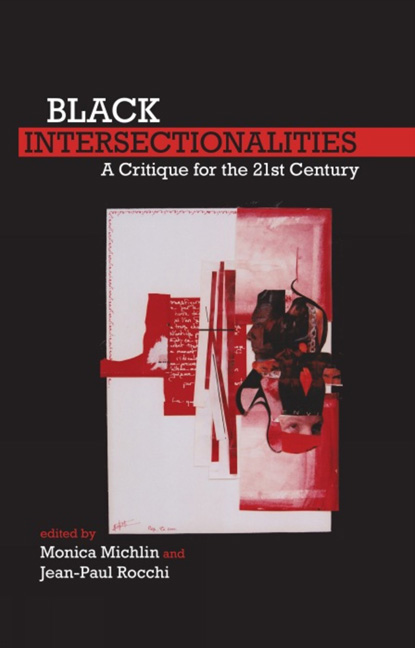Book contents
- Frontmatter
- Contents
- 1 Introduction: Theorizing for Change: Intersections, Transdisciplinarity, and Black Lived Experience
- 2 Exordium: Writing and the Relation: From Textual Coloniality to South African Black Consciousness
- I Challenging Hegemonic Gender Identities
- II Nonconformity and Narrative heorizing
- III Upsurges of Desire
- 9 “Risking Sensuality”: Toni Morrison's Erotics of Writing
- 10 Cultures of Melancholia: Theorizing Desire and the Black Body
- 11 Richard Wright's Poetics of Black Being: Metaphor, Desire, and Doing
- IV Epistemological Genealogies and Prospections
- Contributors
- Index
9 - “Risking Sensuality”: Toni Morrison's Erotics of Writing
from III - Upsurges of Desire
- Frontmatter
- Contents
- 1 Introduction: Theorizing for Change: Intersections, Transdisciplinarity, and Black Lived Experience
- 2 Exordium: Writing and the Relation: From Textual Coloniality to South African Black Consciousness
- I Challenging Hegemonic Gender Identities
- II Nonconformity and Narrative heorizing
- III Upsurges of Desire
- 9 “Risking Sensuality”: Toni Morrison's Erotics of Writing
- 10 Cultures of Melancholia: Theorizing Desire and the Black Body
- 11 Richard Wright's Poetics of Black Being: Metaphor, Desire, and Doing
- IV Epistemological Genealogies and Prospections
- Contributors
- Index
Summary
The women's legs are spread wide open so I hum. (L, 3)
There is movement in the shadow of a sun that is old now. There. Just there. Coming from the rim of the world. A disturbing disturbance that is not hawk nor stormy weather, but a dark woman, of all things. My sister, my me – rustling, like life. (Morrison, in Denard, 2008: 33; italics added)
Isn't the most erotic portion of the body where the garment gapes? […] It is intermittence, as psychoanalysis so rightly stated, which is erotic: the intermittence of skin flashing between two articles of clothing (trousers and sweater), between two edges (the open-necked shirt, the glove and the sleeve); it is this flash itself which seduces rather, the staging of appearance-as-disappearance. (Barthes, 1975: 9)
While past scholarship has explored at great length the inscription of the black body in Morrison's work, recent analysis has focused on her “use of the erotic” – to take up Audre Lorde's phrase (Turpin, 2010) – in an effort to locate her specific work with language in comparison and contrast with Audre Lorde and Dionne Brand. I wish to argue in this chapter that writing the erotic is what Morrison has been “risking” throughout her output since Sula (1973) through Beloved (1987) and Jazz (1992), down to A Mercy (2008). The erotic is not a “theme,” a moment in the novels’ diegesis. It is part and parcel of what writing ventures; it is its daring quest. Incest, pedophilia, rape, gang bangs, pornography – in Lorde's words, “abuse of feeling” (Lorde, 1984: 59) – and the constant probing of “love” – the title of Morrison's eighth novel – go hand in hand with a reclaiming of the erotic that is constitutive of the black subject (in writing), crucial to its survival, and correlative to its freedom. Lorde offers, for her part, a manifesto for a women-identified politics of the erotic incarnated in the autobiographical Zami (Raynaud, 1988; Jay, 1995). The erotic is power; it is knowledge from which black women have been alienated and which they must recover.
- Type
- Chapter
- Information
- Black IntersectionalitiesA Critique for the 21st Century, pp. 128 - 144Publisher: Liverpool University PressPrint publication year: 2013



